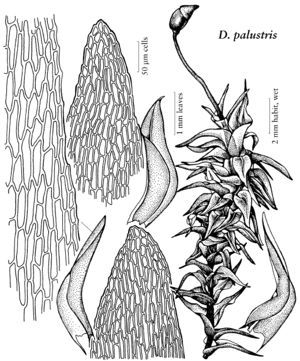Difference between revisions of "Dicranella palustris"
Trans. Brit. Bryol. Soc. 4(2): 247. 1962,.
FNA>Volume Importer |
imported>Volume Importer |
||
| (3 intermediate revisions by 2 users not shown) | |||
| Line 9: | Line 9: | ||
|name=Bryum palustre | |name=Bryum palustre | ||
|authority=Dickson | |authority=Dickson | ||
| + | |rank=species | ||
|publication_title=Fasc. Pl. Crypt. Brit. | |publication_title=Fasc. Pl. Crypt. Brit. | ||
|publication_place=4: 11. 1801 | |publication_place=4: 11. 1801 | ||
| Line 15: | Line 16: | ||
|name=Dicranella squarrosa | |name=Dicranella squarrosa | ||
|authority=(Schrader) Schimper | |authority=(Schrader) Schimper | ||
| + | |rank=species | ||
}} | }} | ||
|hierarchy=Dicranaceae;Dicranella;Dicranella palustris | |hierarchy=Dicranaceae;Dicranella;Dicranella palustris | ||
| Line 30: | Line 32: | ||
|elevation=low to medium elevations | |elevation=low to medium elevations | ||
|distribution=Greenland;Alta.;B.C.;N.B.;Nfld. and Labr. (Nfld.);N.S.;Que.;Yukon;Alaska;Calif.;Maine;Mont.;N.H.;Ohio;Oreg.;Wash.;Europe;Asia (Japan;Turkey). | |distribution=Greenland;Alta.;B.C.;N.B.;Nfld. and Labr. (Nfld.);N.S.;Que.;Yukon;Alaska;Calif.;Maine;Mont.;N.H.;Ohio;Oreg.;Wash.;Europe;Asia (Japan;Turkey). | ||
| − | |discussion=<p><i>Dicranella palustris</i> is known by its squarrose-spreading, decurrent leaves ending in a narrow but rounded and crenulate tip. Lax, relatively large expressions of <i>D. schreberiana</i>, often given recognition as < | + | |discussion=<p><i>Dicranella palustris</i> is known by its squarrose-spreading, decurrent leaves ending in a narrow but rounded and crenulate tip. Lax, relatively large expressions of <i>D. schreberiana</i>, often given recognition as <i></i>var.<i> robusta</i>, are smaller and have leaves with slender, acute tips, serrated margins, and broad cells. The New Hampshire and California reports were by A. J. Grout (1928–1940, vol. 1, as D. squarrosa) and D. H. Norris and J. R. Shevock (2004), respectively.</p> |
|tables= | |tables= | ||
|references= | |references= | ||
| Line 39: | Line 41: | ||
-->{{#Taxon: | -->{{#Taxon: | ||
name=Dicranella palustris | name=Dicranella palustris | ||
| − | |||
|authority=(Dickson) E. F. Warburg | |authority=(Dickson) E. F. Warburg | ||
|rank=species | |rank=species | ||
| Line 54: | Line 55: | ||
|publication year= | |publication year= | ||
|special status= | |special status= | ||
| − | |source xml=https:// | + | |source xml=https://bitbucket.org/aafc-mbb/fna-data-curation/src/2e0870ddd59836b60bcf96646a41e87ea5a5943a/coarse_grained_fna_xml/V27/V27_549.xml |
|genus=Dicranella | |genus=Dicranella | ||
|species=Dicranella palustris | |species=Dicranella palustris | ||
Latest revision as of 22:27, 5 November 2020
Plants relatively robust, 2–11 cm, in loose, light-green or yellow, ± shiny tufts. Leaves not crowded, 2.5–3 mm, abruptly narrowed to a narrow, squarrose limb from an erect, oblong or obovate base, subtubulose and generally ± twisted-crispate when dry, concave when moist, often cucullate at a rounded though often narrow apex, decurrent at base; margins erect, irregularly crenate at the extreme tip; costa subpercurrent, smooth abaxially; distal cells elongate, 4–9:1, the basal cells longer, yellow at the insertion, often ± differentiated at extreme basal angles. Sexual condition dioicous. Seta 10–30 mm, dark red. Capsule 1–1.5 mm, curved-inclined, smooth; annulus present or absent; operculum stoutly conic-rostrate; peristome teeth ca. 500–650 µm, divided about 1/2 way distally, vertically papillose-striolate. Spores 16–25 µm, smooth or papillose.
Phenology: Capsules mature spring.
Habitat: Wet soil in springy places, often at roadsides, sometimes temporarily submerged, probably an acidophile
Elevation: low to medium elevations
Distribution
Greenland, Alta., B.C., N.B., Nfld. and Labr. (Nfld.), N.S., Que., Yukon, Alaska, Calif., Maine, Mont., N.H., Ohio, Oreg., Wash., Europe, Asia (Japan, Turkey).
Discussion
Dicranella palustris is known by its squarrose-spreading, decurrent leaves ending in a narrow but rounded and crenulate tip. Lax, relatively large expressions of D. schreberiana, often given recognition as var. robusta, are smaller and have leaves with slender, acute tips, serrated margins, and broad cells. The New Hampshire and California reports were by A. J. Grout (1928–1940, vol. 1, as D. squarrosa) and D. H. Norris and J. R. Shevock (2004), respectively.
Selected References
None.
